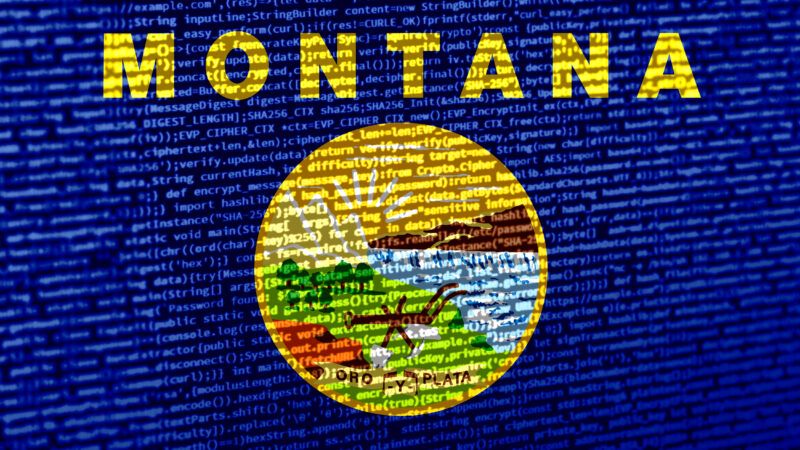New Montana Law Blocks the State From Buying Private Data To Skirt the Fourth Amendment
The Big Sky State becomes the first to close the "data broker loophole" allowing the government to get private information without a warrant.

The Fourth Amendment to the U.S. Constitution is not long—only 54 words, in total. But its core premise can be summed up with a simple phrase: Come back with a warrant.
The Fourth Amendment protects people "against unreasonable searches and seizures." Any law enforcement operative hoping to search or seize your "persons, houses, papers, [or] effects" must get a warrant, showing "probable cause, supported by Oath or affirmation, and particularly describing the place to be searched, and the persons or things to be seized."
But in recent years, as Americans began storing larger portions of their personal information online, governments started buying this data, circumventing the Fourth Amendment's guarantees of protection. This week, Montana became the first state to restrict the practice.
In 2018, the U.S. Supreme Court affirmed in Carpenter v. United States that the government cannot search a suspect's cell phone without a warrant.
"A person does not surrender all Fourth Amendment protection by venturing into the public sphere," including by storing personal information on their phone, Chief Justice John Roberts wrote for the majority. "Although such records are generated for commercial purposes," that does not "negate" one's "anticipation of privacy."
But in the years since, governments have gotten around that pesky constitutional prohibition by simply buying people's data, with the public's money.
Companies have access to reams of information about their users, and they often sell that data—anonymized—to firms called data brokers, who then bundle it and sell it to other companies, like advertisers. "A large portion of data brokerage is used for identity verification or fraud prevention," Paul Boutin wrote in Newsweek. "Much of it is used for traditional marketing."
But governments got in on the action, too. Federal agencies like the IRS and Immigration and Customs Enforcement spent millions of dollars buying access to data that would otherwise require a warrant. In 2022, the Associated Press reported that police departments across the country had purchased and used "an obscure cellphone tracking tool, at times without search warrants, that gives them the power to follow people's movements months back in time."
As early as January 2022, the Office of the Department of National Intelligence was aware that the intelligence community "currently acquires a large amount of [commercially available information]," which "includes information on nearly everyone that is of a type and level of sensitivity that historically could have been obtained, if at all, only through targeted (and predicated) collection" and therefore "clearly provides intelligence value." While the data are typically anonymized, intelligence agencies are often able "to deanonymize and identify individuals, including U.S. persons."
The collection nonetheless continued apace. Certain lawmakers tried to rein in the practice, with little success: The U.S. House of Representatives passed the Fourth Amendment Is Not For Sale Act in the last congressional session but it stalled in the U.S. Senate.
Despite the federal government's failure to halt this practice, there has been success in the states. In February, Montana state Sen. Daniel Emrich (R–Great Falls) introduced Senate Bill 282, which says that except "pursuant to a search warrant or investigative subpoena issued by a court, a governmental entity may not purchase" such data as "electronic communications," "contents of electronic communications," "precise geolocation data," or other "sensitive data."
It further affirms that "a government entity may not obtain the stored data of an electronic device without a search warrant issued by a court upon a finding of probable cause," with exceptions such as when the device's owner gives permission, in the case of "an emergency involving danger, death, or serious physical injury," and "the electronic communications of adults or youth currently incarcerated in a correctional facility."
The bill passed both chambers of the Montana Legislature, and Gov. Greg Gianforte (a Republican) signed it into law this month.
Granted, this still leaves 49 states, plus every federal agency, free to exploit a constitutional loophole by using taxpayer money to spy on taxpayers. But it is a positive step forward and signals that lawmakers could come together and recognize the very real threat the practice poses and put a stop to it.
"Montana has done something that many states and the United States Congress have debated but failed to do: it has just enacted the first attempt to close the dreaded, invasive, unconstitutional, but easily fixed 'data broker loophole,'" wrote Matthew Guariglia, senior policy analyst at the Electronic Frontier Foundation. "Montana, with a population of just over one million people, is showing other states how it's done."


Show Comments (12)